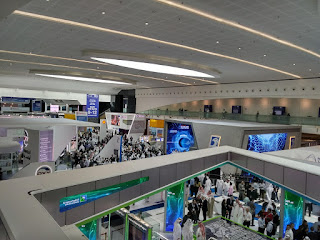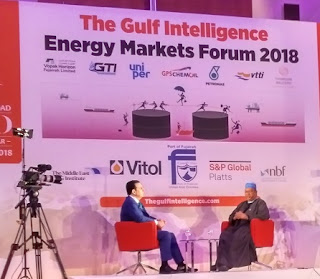Day three of ADIPEC 2019 has just concluded here in Abu Dhabi, UAE and much was said about oil demand concerns. Morning discourse was coloured by the International Energy Agency's take that demand is set to plateau by 2030 due to a pick up in the use of electric vehicles around the world.
In its latest market projections, the IEA said overall demand for energy is set to increase by 1% every year until 2040, however headline demand will plateau ten years earlier than it had previously forecast.
Elsewhere in its World Energy Outlook report, the IEA said US shale output, which has made the country the world's biggest oil producer, is likely to stay higher for longer than previously projected, with the country accounting for 85% of the increase in global oil production by 2030, and for 30% of the increase in natural gas.
Meanwhile, switching tack to the coming 12 months, OPEC Secretary General Mohammed Barkindo said an uptick in demand for 2020 may be on the cards should the US-China trade stand-off end.
"We are confident that there will be a deal and the deal will be positive for the world economy and will remove the dark cloud that has engulfed the global economy because of the size of the countries," Barkindo said on the sidelines of ADIPEC.
Among the VIPs in town today was Sheikh Mohammed bin Rashid Al Maktoum, Prime Minister and Ruler of neighboring Dubai. Alongside his visit, came that of nearly 900 local school kids to learn more about the industry, its processes, careers and well to marvel – perhaps like the rest of us – at some of the innovative robots and kits on display here.
And then there's the launch of a new branch of local government focused on research and development as well as an artificial intelligence (AI) joint venture inked by the Abu Dhabi National Oil Company (ADNOC) to take in.
The new Abu Dhabi Research and Development Authority will be tasked with inventions that tackle Earth's most pressing challenges. Under auspices of the emirate's Department of Education and Knowledge (ADEK), five virtual research institutes will focus on biotechnology, food security, sustainability, artificial intelligence and high-performance computing, and advanced materials. The announcement came in step with ADNOC's agreement at ADIPEC with UAE-based AI company, Group 42, on a joint venture to develop AI products for the energy sector.
 In sync with this hot topic, the Oilholic also participated in ADIPEC Middle East Petroleum Club's Leadership dialogue on Human and machine collaboration and the impact this has on current business transformation.
In sync with this hot topic, the Oilholic also participated in ADIPEC Middle East Petroleum Club's Leadership dialogue on Human and machine collaboration and the impact this has on current business transformation.
IIoT, big data, augmented reality and virtual reality premised solutions, and the changing nature of the workforce were all under a lively 90-minute discussion with Greg Cross, Co-founder of Soul Machines and AI pioneer (third from left) leading the talk.
Finally, here is one's analysis for Rigzone on why BP and Shell's low carbon overtures and portfolio tweaking hold both oil majors in good stead despite a dire set of numbers. That's all for the moment folks, more from here on the final day at ADIPEC tomorrow. Keep reading, keep it ‘crude’!
To follow The Oilholic on Twitter click here.
To follow The Oilholic on Forbes click here.
To email: gaurav.sharma@oilholicssynonymous.com
© Gaurav Sharma 2019. Photo I: Day three of exhibition at ADIPEC 2019. Photo II: Industry robot at Total's stand. Photo III: AI pioneer Greg Cross speaks at ADIPEC Middle East Petroleum Club, Abu Dhabi, November 2019 © Gaurav Sharma 2019.








